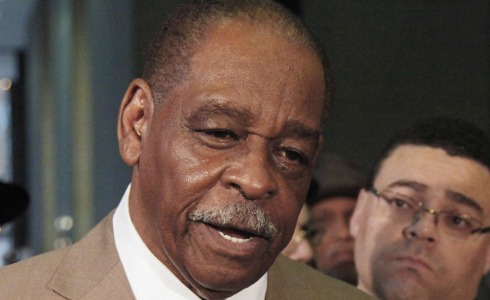 Pictured, Cook County Commissioner William Beavers speaks to reporters after his March 2012 arraignment on federal tax-evasion charges. Jury selection is set to begin this week for the 78-year-old Democrat who is accused of diverting tens of thousands of dollars from campaign accounts for personal use without reporting it and then trying to cover it up. (AP Photo/Charles Rex Arbogast, File)
Pictured, Cook County Commissioner William Beavers speaks to reporters after his March 2012 arraignment on federal tax-evasion charges. Jury selection is set to begin this week for the 78-year-old Democrat who is accused of diverting tens of thousands of dollars from campaign accounts for personal use without reporting it and then trying to cover it up. (AP Photo/Charles Rex Arbogast, File)
Would-be jurors at the tax-evasion trial of Cook County Commissioner William Beaver are scheduled to begin filling out questionnaires as the process of picking 12 panelists begins in earnest.
Later Tuesday, Beavers’ judge will vet prospective jurors by questioning them one by one. Several alternates will also be chosen for the Cook County commissioner’s trial.
Judge James Zagel says a jury should be in place by Wednesday, with openings happening the same day.
Beavers has pleaded not guilty to four tax counts for allegedly taking money from his campaign fund for personal use and not reporting it. Each count carries a maximum three-year prison term.
The tough-talking Democratic remained defiant as his tax-evasion trial resumed Monday after a three-month delay, vowing to testify and challenge prosecutors when testimony begins in coming days.
Addressing reporters outside court after proceedings adjourned, the 78-year-old politician said about prosecutors that, “I’ve got to tell what these people are all about.”
“If I don’t get on the stand, you’ll never know,” said the former police officer and one-time Chicago alderman. “What they’re really all about is that they tell some tall tales. And I gotta straighten them out.”
While the case otherwise focuses on dry tax and accounting issues, it has attracted so much attention, in part, from the prospect that the old school politician with his shoot-from-the-hip swagger could testify.
Beavers is known for crude if memorable rhetorical flourishes, the most famous of which came years ago when he offered a favorable estimation of his own prowess, calling himself “a hog with big nuts.”
Would-be jurors start filling out questionnaires Tuesday, and then answer questions one by one from the judge. A jury should be in place by Wednesday, after which the sides will deliver opening statements.
Beavers has pleaded not guilty to charges he diverted more than $225,000 from campaign coffers to support a gambling habit and for other personal use without reporting it on 2006 through 2008 returns.
The defense Beavers has signaled he wants to mount at his Chicago trial may rely on him speaking directly to the jurors.
His lawyers have argued that his is essentially a case of no harm, no foul — that he paid back the money at issue and amended his returns, albeit only after he learned he was under investigation in 2009.
But Judge James Zagel has ruled that that line of argument will only be admissible if it comes from Beavers’ mouth on the stand. Prosecutors say whether Beavers paid the money back belatedly isn’t relevant to whether he broke the law by evading his taxes to start with.
Beavers has accused prosecutors of charging him out of retribution because he refused a request from authorities in 2009 to wear a wire against another commissioner, John Daley, former Chicago Mayor Richard M. Daley’s brother.
Zagel has said defense attorneys can’t make the argument to jurors that prosecutorial vindictiveness motivated the charges. On Monday, however, he seemed to leave the door open to the possibility of letting the defense question a federal investigator about the allegation.
Also on Monday, Zagel said he would keep the names of jurors sealed until after the trial ends — a rare move normally reserved for mob or terrorist trials, or for especially high-profile cases.
In explaining why he opted for an anonymous jury, Zagel noted the case had drawn major media interest in the Chicago area.
“I’m trying to ensure there are no outside contacts with jurors,” he said.
In all, Beavers has pleaded not guilty to four tax counts. If convicted, he faces a maximum three-year prison term on each count.
He also is accused of failing to declare that he took more than $68,000 in campaign money and put it in a city fund to double the monthly pension he got for serving as an alderman for years.